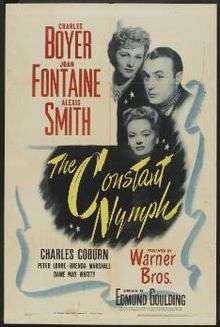The Constant Nymph (1943 film)
| The Constant Nymph | |
|---|---|
 1943 film | |
| Directed by | Edmund Goulding |
| Produced by |
Henry Blanke Hal B. Wallis |
| Written by |
Margaret Kennedy (novel and play) Basil Dean (play) Kathryn Scola |
| Starring |
Joan Fontaine Charles Boyer Alexis Smith |
| Music by | Erich Wolfgang Korngold |
| Cinematography | Tony Gaudio |
| Edited by | David Weisbart |
| Distributed by | Warner Bros. Pictures |
Release dates |
|
Running time | 112 minutes |
| Country | United States |
| Language | English |
| Budget | $1.9 million (US rentals)[1] |
The Constant Nymph is a 1943 romantic drama film starring Charles Boyer, Joan Fontaine, Alexis Smith, Brenda Marshall, Charles Coburn, May Whitty, and Peter Lorre.[2] It was adapted by Kathryn Scola from the Margaret Kennedy novel and play by Kennedy and Basil Dean, and directed by Edmund Goulding.
Plot
Lewis Dodd (Charles Boyer) is a composer whose symphony flops in London. Seeking new inspiration, and to escape his critics, he travels to Switzerland to stay at the home of older friend Albert Sanger (Montagu Love). Sanger's four young daughters—Kate (Jean Muir), Toni (Brenda Marshall), Tessa (Joan Fontaine) and Paula (Joyce Reynolds)—have been raised in relative isolation, and swiftly develop crushes on Lewis. The elderly Sanger dies, and per his instructions Lewis sends for Charles Creight (Charles Coburn), Sanger's wealthy friend. Lewis is inspired by the girls to write some of the first heart-felt music he's composed in years. Kate leaves for school, and Toni marries. Lewis falls in love with Creighton's beautiful, grown daughter, Florenc (Alexis Smith). Tessa and Paula are sent to boarding school. Lewis and Florence marry and move to London, but ambitious Florence angers Lewis by trying to push his career too hard. Tessa (who has a bad heart) and Paula run away from school to the Dodd house. Lewis is inspired by Tessa to write beautiful music again, and Florence realizes Lewis is falling for the teenage girl. Florence bitterly confronts Tessa. Lewis' inspired symphony is performed to great acclaim, and during the performance Lewis rushes hom and asks Tessa to marry him. Tessa refuses, as he's already married. Returning to the theater, Florence tells Lewis she will divorce him, as it is clear that Tessa is not only his great muse but also his true love. Lewis rushes home to tell Tessa, but finds her dead—the conflict with Florence having been too much for her.
While Lewis is visiting, the Sanger girls have other visitors from England: the very wealthy Charles Creighton and his daughter, Florence. Lewis quickly asks Florence to marry him, breaking the heart of Tessa, who has been secretly in love with him for a long time.
Cast
- Charles Boyer - Lewis Dodd
- Joan Fontaine - Tessa Sanger
- Alexis Smith - Florence Creighton
- Brenda Marshall - Toni Sanger
- Charles Coburn - Charles Creighton
- May Whitty - Lady Longborough
- Peter Lorre - Fritz Bercovy
- Joyce Reynolds - Paula Sanger
- Jean Muir - Kate Sanger
- Montagu Love - Albert Sanger
- Eduardo Ciannelli - Roberto
- Janine Crispin - Marie
- Doris Lloyd - Miss Hamilton
- Joan Blair - Lina
- André Charlot - Dr. Renee
- David Clyde - Florist
Reception
Fontaine was nominated for the Academy Award for Best Actress, but lost to Jennifer Jones's performance in The Song of Bernadette.[3]
Availability
The will of Margaret Kennedy stated that the film could be shown only at universities and museums after its original theatrical run ended. As a result, the film was unavailable for exhibition for nearly seventy years. The film received its first authorized public screening in decades as part of the 2011 Turner Classic Movies Classic Film Festival.[4][5]
Edmund Goulding's biographer Matthew Kennedy wrote that Joan Fontaine spoke "rapturously" of The Constant Nymph. "She was nominated for a best actress Oscar for it," he stated, "and it remains a personal favorite of hers."[6]
The film was released on DVD under the Warner Archive Collection label on 22 November 2011.[7]
Radio adaptation
The Constant Nymph was presented on Hollywood Players December 17, 1946. Fontaine reprised her role from the film.[8]
See also
References
- ↑ "Top Grossers of the Season", Variety, 5 January 1944 p 54
- ↑ LIFE. "Movie of the Week: The Constant Nymph" - August 2, 1943 - Page 38.
- ↑ "The Constant Nymph". Academy of Motion Picture Arts and Sciences. Retrieved 2014-02-10.
- ↑ TCM Fest: 'The Constant Nymph' (1943), a rediscovered gem
- ↑ TCM Classic Film Festival: 'Night Flight,' 'The Constant Nymph,' 'Hoop-La'
- ↑ Kennedy, Matthew (2004). Edmund Goulding’s Dark Victory: Hollywood’s Genius Bad Boy. University of Wisconsin Press.
- ↑ DVD Savant Review: The Constant Nymph
- ↑ "'Nymph'". Harrisburg Telegraph. December 14, 1946. p. 17. Retrieved September 11, 2015 – via Newspapers.com.

External links
- The Constant Nymph at the American Film Institute Catalog
- The Constant Nymph at the Internet Movie Database
- The Constant Nymph at the TCM Movie Database
- The Constant Nymph at AllMovie
- THE SCREEN; ' The Constant Nymph,' With Joan Fontaine, Alexis Smith, Brenda Marshall and Charles Boyer, Arrives at the Strand (New York Times Movie Review)